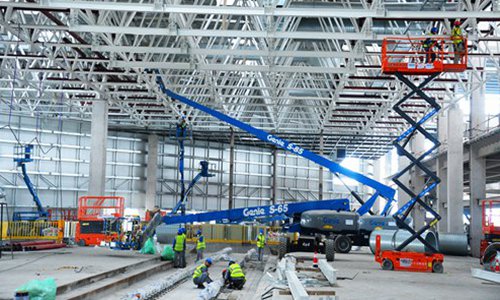HOME >> BUSINESS
Tesla brings limited opportunities to car parts producers
By Xie Jun Source:Global Times Published: 2019/7/29 21:16:26

Tesla's Gigafactory 3 is under construction in Lingang, Pudong New Area, Shanghai, June 9. Photo: IC
Mass production of the Tesla Model 3 in Shanghai will offer opportunities to China's auto parts manufacturers, including expanding Tesla's supply contracts with the carmaker's existing Chinese suppliers or finding new local partners, but the effects won't be strong, experts said."The impact of Tesla's Shanghai-based assembly line will be smaller than some people might imagine, and it won't save China's car parts industry from its downturn," Wu Shuocheng, a Shanghai-based independent automobile analyst, told the Global Times on Monday.
Domestic news portal yicai.com recently cited an executive from Tesla as saying that the Tesla Shanghai plant might start mass production at the end of this year, and that the Shanghai plant would striver for the best industrial chain allocation among Chinese car parts suppliers. Tesla didn't respond to interview request as of press time.
Tesla said that construction work on the plant has "exceeded normal expectations" and that it will be capable of making cars by the end of this year, according to a report by thepaper.cn in mid-July.
According to Wu, Tesla's mass production in Shanghai might push it to update orders with existing domestic suppliers, such as those with Shanghai Baolong Automotive Corp.
Ningbo Tuopu Group, which became a Chinese supplier for Tesla in 2016, didn't reply when contacted by the Global Times on Monday.
Glass manufacturer Fuyao Glass, which is based in East China's Fujian Province, recently revealed that it is researching and developing equipment needed for Tesla's mass production, but the products' supply needs further confirmation from Tesla. A Fuyao Glass public relations representative declined to disclose further details on Monday.
However, the impact of Tesla's localization on China's car parts industry will be limited, particularly for core parts including the electric motor, battery and the electric controller, experts said.
"Tesla's requirements for intelligent parts can't be met by most domestic suppliers because of technical bottlenecks," car industry analyst Jia Xinguang told the Global Times on Monday.
Wu also said that it often takes years for a carmaker to develop new core parts suppliers. "Also, because it's hard to estimate the expansion of Tesla's production, many local suppliers would think twice about supplying the US brand, which is a newcomer to the Chinese market," he said.
"Considering that the number of parts needed for electric cars is much fewer than traditional internal-combustion cars and that Tesla's production scale won't be too large in the beginning, there won't be any obvious changes to the domestic car parts industry in the short term," he noted.
The domestic car parts industry is in the doldrums currently as market demand for cars shrinks. That's especially true of companies that focus on original equipment manufacturing, Wu said.
China remained Tesla's second-largest market in the first half of 2019, with car sales surging by 41.8 percent on a yearly basis, Tesla disclosed in a filing on Monday.
Posted in: COMPANIES